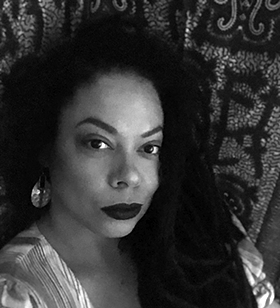Denial is a Cliff We Are Driven Over
I want to believe Don West
when he writes: none of mine
ever made their living by driving slaves.
But in my grandfather’s mouth that utterance
would’ve taken on another meaning:
In the memory my mother shares,
he is flitting across Louisville
in his taxi, passing back-and-forth
like a cardinal, red-faced, proud-breasted,
delivering Black folks their dry cleaning—
had to, she tells me, as part of his route—
but once he started his second shift and turned
on the cab light, he wouldn’t accept
Black fare. I recall him reciting
the early presidents’
racist pseudoscience—American
at its liver—to rationalize his hatred
of my father, his denial
of my Blackness. That denial a peril
I survived, a cliff he could have driven me over
at any moment of my childhood. Maybe,
I want to think, because they were poor men
who labored, farmed tobacco and dug for oil,
my grandfather’s people resisted
slavery, felt a kinship with my father’s people.
Or that because my grandfather
was one of eleven mouths to feed
on their homestead—reduced to dirt
across the Great Depression—
he had a white identity to be proud of, a legacy
that didn’t join our names
in a bill of sale, but in struggle.
I search his surname and it travels
back to Germany, appears
on the deed to the house he inherited,
retired and died in, poor-white resentment
inflaming his stomach and liver.
But when I search the name I share with my father,
my only inheritance disappears
into the 19th century, sixth generation:
my ancestor bred
to produce 248 offspring
for his owner, from whence comes
our family name. Mr. West, here
we are different. Here, is where
my grandfather found his love for me discordant
as the voice of the dead whispering
history. Here is where we are connected,
not by class, but blood & slavery.
Copyright © 2020 by Joy Priest. Originally published in Poem-a-Day on August 28, 2020, by the Academy of American Poets.
“Last year, I was invited by another Kentucky poet, Rebecca Gayle Howell, to contribute to an anthology that she was putting together around the work of Don West, a white Appalachian labor organizer and educator who led the Kentucky Workers' Alliance in the 1930s. West was very dedicated to working across racial lines, but a lot of his writing and dialogue around race focused on minimizing his own culpability rather than trying to understand the specific plight of the Black worker and how work and race are inextricably and foundationally linked for the American empire. I felt it was important to texture the limited framework of ‘privilege,’ and demonstrate that—yes, while Black folks were picking cotton there were poor white folks working the cotton mills, but there were still so many major degrees of historical difference in terms of the paths of development, or lack thereof, allowed to our people. Howell, who describes West's poems as ‘proletariat anthems’ formerly published in pamphlets, welcomed complicated, critical, or questioning perspectives in response. I felt the duty to recover not only this personal history and larger Kentucky history of racial coalition among the worker class but also what worked or hasn't worked in the past and what we've already tried—namely the white leader as vanguard, the ineffectiveness of which is evident when you realize West, in his racial myopia, was allowed to live and the Black proletariat coalition organizer Fred Hampton was not.”
—Joy Priest

